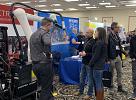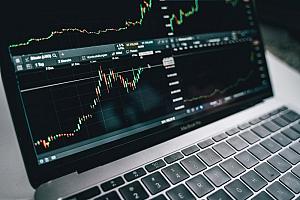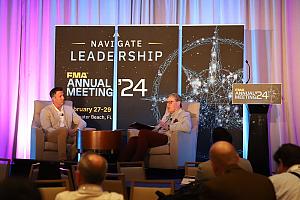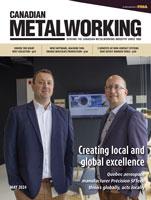Vice-President
- FMA
- The Fabricator
- FABTECH
- Canadian Metalworking
Use your money wisely in a recession
No matter the financial situation, it’s always a good idea to seek advice from a CPA
- By Ken Hurwitz
- July 22, 2020
Now that we are well into the summer, as well as months into dealing with COVID-19 and the ensuing economic impact, it’s a good time to recap why it’s a good idea to use a leasing option when adding new equipment.
The reasons for keeping money in the corporate bank account are no different in a slow economy than when it is booming: Cash is always king. Therefore, maintaining a solid cash balance is always preferred regardless of market conditions.
I recently had a chat with chartered professional accountant Ian Campbell, who provided some additional thoughts, and between the two of us, we discussed three reasons we would recommend equipment lease financing to Canadian manufacturers:
1. Operating leases are a tax-friendly transaction.
When a piece of equipment is bought outright, either in cash, with a bank loan, or using a line of credit, the buyer takes immediate ownership and the equipment becomes an asset on their balance sheet.
From a taxation perspective, the benefits of ownership allow the buyer to depreciate the asset, which is a fancy way of reducing earnings and paying less tax. However, if the purchase happens near the end of the year, the tax savings may be small if the CRA doesn’t allow a full year’s depreciation to be used.
Another method to handle a purchase transaction is to set it up as an operating lease. This is a contract that allows for the use of an asset but does not convey rights of ownership of the asset. The leasing company maintains ownership.
The equipment is not put on the books as an asset but instead is accounted for as a rental expense in what is known as off balance sheet financing. This doesn’t show up as an asset or liability on the balance sheet.
From a financial perspective, the buyer’s financial efficiency improves dramatically because a new income-generating piece of equipment has been installed, allowing the company to create more sales and profits from the same amount of assets.
“I’d also say that, typically, while more expensive, leasing is more convenient and the typical leasing company is more responsive than traditional banks,” said Campbell.
2. Lease equipment and invest money where it will earn the best return.
Machinery and equipment are by nature depreciating assets. Even the finest Japanese or European machine tools hold their maximum value the day before installation. A smart owner uses money for investments that provide the greatest return, for example, hiring an additional salesperson.
Many of my clients are owner/operators, meaning that they run the plant, making sure good parts are delivered to their customers, and handle all the proposals (quoting/estimating).
They function as both sales manager and plant manager. These two roles are best handled by two people. Depending on the business, it could make a lot of sense to bring someone in or reassign a role to a current employee to handle sales. I can tell you from first-hand experience that business development is a full-time job, and also one that generates a high return.
Investing in your business is always the best use of working capital and is something that cannot be financed.
3. Leasing allows your company to increase its borrowing capacity significantly.
A typical leasing company has no intention of replacing a bank. My largest and most successful customers have well-established banking relationships with large operating lines, which they primarily and properly use for short-term debt like financing receivables or covering short-term costs for buying tooling and material. They use equipment leasing as a complement to their bank.
They match lenders with their debt requirements and often don’t use working capital for long-term investment in machinery and equipment.
However, some banks won’t give large amounts of money to certain buyers if they don’t meet the bank’s financial requirements first.
Buying the latest technology can be a very expensive proposition and despite the fact good equipment, when maintained properly, will run in a plant for more than a decade, the industry often is difficult for a typical banker to understand.
We recently hired a new credit analyst who came from a chartered bank and I got a first-hand account of how banks review assets. He told me that banks look at every asset, whether it is a machine tool or a trailer, and assume that if the deal goes bad, they will recover about 20 per cent of its original value. When a leasing company with expertise in machinery and equipment looks at that same transaction, it knows that the recovery typically is a much higher percentage and will approve the transaction because it sees the perceived risk as much smaller.
Campbell provided more advice on working in the current market conditions:
- Keep your financial reporting and short-term financial forecasting up to date.
- Keep a close eye on your working capital, which usually is accounts receivable, accounts payable, and inventory.
- Stay in constant contact with customers and suppliers.
- When the market turns, put financing in place even if it isn’t immediately necessary to be prepared for the next tough market, because it is much easier to deal with banks in good times.
Ian Campbell CPA, CA, MBA is owner of Ian R. Campbell Professional Association,, 36 Toronto St., suite 600, Toronto M5C 2C5, 416-504-4437.
Ken Hurwitz is senior account manager, Blue Chip Leasing Corp., 416-614-5878, www.bluechipleasing.com.
subscribe now


Keep up to date with the latest news, events, and technology for all things metal from our pair of monthly magazines written specifically for Canadian manufacturers!
Start Your Free SubscriptionAbout the Author

Ken Hurwitz
41 Scarsdale Road Unit 5
Toronto, M3B2R2 Canada
416-499-2449
- Trending Articles
Modest manufacturing growth appears likely

There’s no business like show business

Tighitco, DCM Group Aerospace join forces on Airbus A220 program

Software automatically identifies vulnerable production assets

NAIT names Sandvik Coromant the 2024 Distinguished Industry Partner

- Industry Events
MME Saskatoon
- May 28, 2024
- Saskatoon, SK Canada
CME's Health & Safety Symposium for Manufacturers
- May 29, 2024
- Mississauga, ON Canada
DiPaolo Machine Tools Open House 2024
- June 4 - 5, 2024
- Mississauga, ON Canada
FABTECH Canada
- June 11 - 13, 2024
- Toronto, ON Canada
Zoller Open House & Technology Days 2024
- June 12 - 13, 2024
- Ann Arbor, MI
















